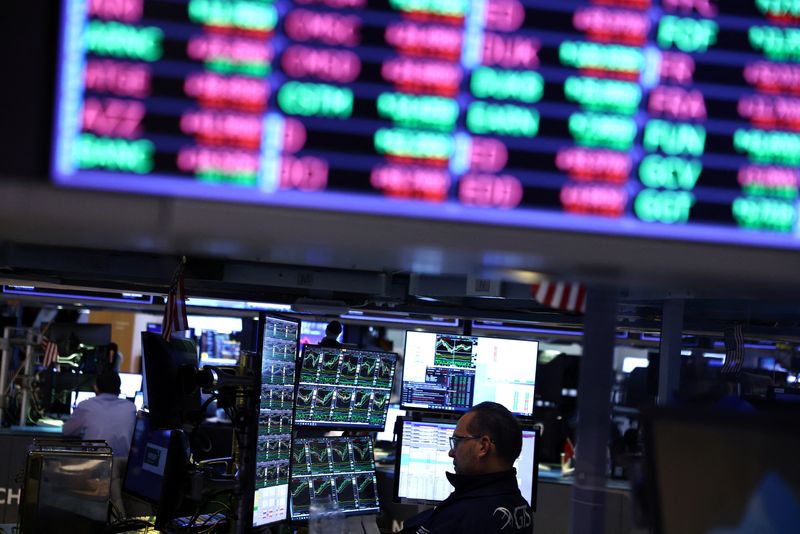By Marc Jones
LONDON (Reuters) - The first six months of 2023 have been eventful for financial markets - from an artificial intelligence (AI) inspired tech stock surge, commodity market capitulations, cryptocurrency comebacks to the worst banking crash since Lehman Brothers.
Linking it all has been the relentless rise in interest rates, which was exactly what battered markets in 2022. But just that this time has been different due to an unshakeable view that the end of the cycle is near.
The result? A 12%, or $6 trillion, rally in value of world stocks although it has been ominously top heavy.
Thanks largely to ChatGPT, the AI boom has seen the 'Big Tech' giants enjoy a combined surge of 70%..
Apple (NASDAQ:AAPL), Microsoft (NASDAQ:MSFT), Google parent Alphabet (NASDAQ:GOOGL), Amazon (NASDAQ:AMZN) and Netflix (NASDAQ:NFLX) have made 35%-50% gains.
Meta and Tesla (NASDAQ:TSLA) have more than doubled, while AI's demand for semiconductor chips catapulted Nvidia 180% higher, briefly adding it to the elite club of U.S. companies with a $1 trillion market value.
"Basically, things looked so grim at the end of last year that it hasn't taken much to lift the markets," said Trevor Greetham, head of multi asset, Royal London Asset Management.
But on the tech surge, he said that "it might well be a bubble", with the firms now effectively needing to bank a 40% jump in earnings to justify their lofty valuations.
Japan's Nikkei share average has been another stellar performer this year, surging 16% in dollar terms, or 26% in yen terms, setting it up for its best year in a decade.
Gold has jumped 5%, benchmark government bonds are up 3%-6%, while the world's most financially damaged countries have done even better.
Bonds in El Salvador, which is now battling out of a default, have returned a whopping 58%. Sri Lankan bonds made a return of 34%, Zambia 24% and war-ravaged Ukraine, Pakistan and serial-defaulter Argentina have all made 19%, each.
"It has been remarkable" said Abrdn emerging market portfolio manager Viktor Szabo. "Roughly half of last year's losses have been made back this year and it has all been in the last couple of months."
YEN AND YUAN
The dollar has been steadier overall although the fact that Japan hasn't raised interest rates yet and China's economy is still spluttering mean the yen and yuan are down 9% and nearly 5%, respectively.
Turkey's efforts to tackle its problems following Tayyip Erdogan's re-election haven't been made any easier by another 28% dive in the lira.
Egypt has devalued its currency more nearly 20%, Nigeria has cut naira by 40%, while at the other end of the table Colombian and Mexican pesos and Hungary's forint are up between 10% and 17%.
There have also been around a total of 90 interest rate hikes this year by central banks globally versus just 17 cuts. If last year's rate actions are also added, it comes to just over 470 hikes, compared to 1,202 cuts since the global financial crash in 2008.
The U.S. Federal Reserve has lifted rates by 500 basis points (bps) from near zero last year, the European Central Bank has hiked rates by 400 bps and many developing world economies have done far more. Even the Bank of Japan's ultra-loose monetary settings may be approaching a crossroads.
And it has all caused a plenty of churn.
Two-year Treasury yields, which are highly sensitive to the Fed's moves, rose from 4% to 5% in February, only to dive back to 3.5% when Silicon Valley Bank, a mid-sized U.S. lender few had even heard of, collapsed and consequently led to the 167-year-old Swiss behemoth Credit Suisse (SIX:CSGN) requiring an emergency rescue by UBS.
Fast forward and that rate is now at 4.8%. Europe's rates are marching up again and the gap between two and 10-year U.S. Treasury yields - a traditional harbinger of recession - is almost as inverted as it was before the blow-ups.
A RATE MISTAKE
In the cryptomarkets, bitcoin has bounced back with a bang, soaring more than 80% in typically volatile fashion.
Interest from Wall Street giants including BlackRock (NYSE:BLK) are also fuelling gains, although U.S. regulators suing Binance and Coinbase (NASDAQ:COIN) exchanges exposed crypto's vulnerability to regulatory crackdowns.
Commodities, another crucial piece in the macro jigsaw, have been subdued.
A 51% drop in Europe's natural gas prices, oil slipping 13%, and sharp declines in wheat and corn have all fed hopes of lower global inflation.
And while the 'Goldilocks' view of inflation and rates topping out may have won in the first half of 2023, the bears are still swinging.
"Risk premia have to rise," said Milla Savova, a European equity strategist at BofA, which having been wrongfooted by the rally this year is now predicting a 15% drop in the STOXX 600 and a recession by the start of 2024.
She warned the sheer aggressiveness of the rate hike cycle was now tipping economies over the edge. "We think that this will be seen as a policy mistake when we look back in the years to come."
